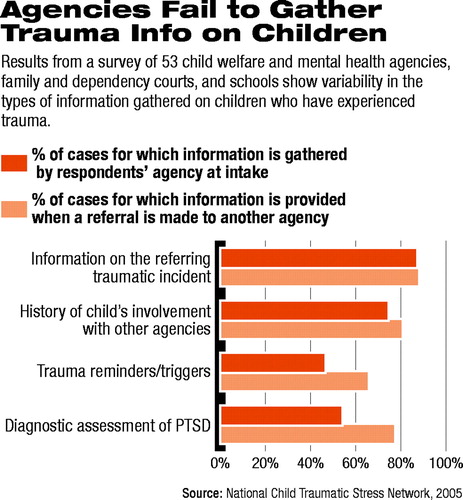Agencies Often Overlook Need To Assess Trauma in Children
A number of public agencies charged with serving youth who have experienced trauma fail to gather information systematically about those traumatic experiences, including factors that trigger responses related to past trauma.
An additional shortcoming appears to be a failure to assess children consistently for posttraumatic stress disorder (PTSD), according to a report released in March by the National Child Traumatic Stress Network.
The report, titled “Helping Children in the Child Welfare System Heal From Trauma: A Systems Integration Approach,” found that children who have been removed from their homes due to abuse and neglect and placed in the public system “have an extremely high risk for mental health problems, especially traumatic stress.”
To obtain the information for the report, members of the network's Systems Integration Working Group conducted interviews in 10 states with representatives of 53 mental health, child health, and foster care agencies; schools; and family/dependency courts.
The agencies were not randomly selected, but chosen on the basis of proximity and familiarity to members of the work group, so the data presented are not generalizable.
Respondents answered questions about the type and amount of information they request from agencies that refer children to them, the type of information they collect while the child is under their care, and the information they communicate to staff from other agencies who also are working with a particular child.
“Many organizations working with traumatized children focus only on addressing traumatic reactions, such as anger or irritability, or symptoms such as avoidance,” the report stated. “They fail to address the underlying trauma that gives rise to problematic behavior and the trauma reminders that can trigger posttraumatic reactions.”
Agencies surveyed reported that they gather information on the duration and number of traumatic episodes for about 69 percent of children, on average. For just 47 percent of children do agencies gather information on factors that trigger a particular child's trauma (see chart).
On average, survey respondents indicated that they screened for PTSD in only about half (54 percent) of children with known trauma histories.
The data suggest that the agencies surveyed are not systematically gathering crucial information on trauma, according to Lisa Amaya-Jackson, M.D., M.P.H., and as a result, many children who have experienced trauma and who come into contact with these agencies are left untreated for the consequences of that experience.
Amaya-Jackson served on the work group that issued the report. She is associate director of the UCLA-Duke University Center for Child Traumatic Stress and an associate professor of psychiatry and behavioral sciences at Duke University Medical Center.
“We not only have the ability to assess children for trauma exposure and trauma-specific consequences, but we also have empirically supported treatments to offer children and families,” she told Psychiatric News.
The survey also showed that less than half (44.7 percent) of the agencies train staff about evidence-based treatments for children with trauma histories, and 61 percent said they train staff on how to assess for trauma in children.
The report issued a number of recommendations for members of the work group and other groups within the National Child Traumatic Stress Network. They include the following:
To work with national child welfare and dependency court organizations to develop and promote training about child trauma. | |||||
To promote the use of appropriate standardized assessment measures for child trauma within the service systems, including public, child welfare, and court systems. | |||||
To promote the dissemination of evidence-based practices within public child-serving systems. | |||||

“Child trauma and its repercussions are a major public health concern,” Amaya-Jackson said. “Information about empirically supported treatments.. .can and should be shared between agencies.”
The report, “Helping Children in the Child Welfare System Heal From Trauma: A Systems Integration Approach” is posted online at<www.nctsnet.org>.▪



